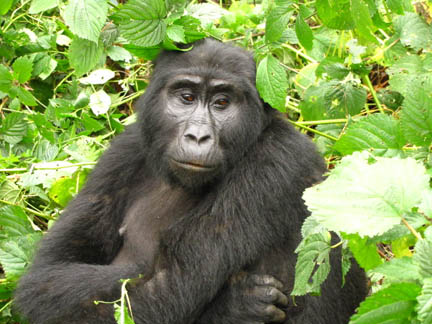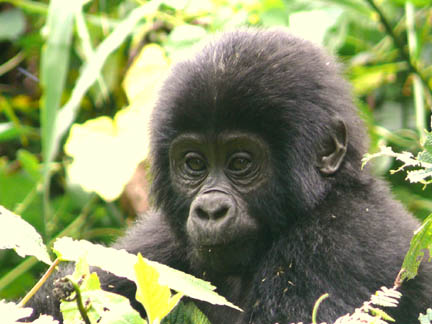The following article is an account sent in by David Agenya (davidagenya@gmail.com), Head Guide at Bwindi Park, South Western Uganda. The rich ecosystem of this park protects the endangered mountain gorillas. Gorilla tracking is a popular tourist
activity.
Here is what David has to add in his own words.
David with his back to a gorilla
On your arrival to Bwindi park head quarter, you will be given warm welcome by any guide on sight and later handed to Head guide like me for the general briefing. Thereafter, you will be allocated guides in each group.
Mountain gorillas live in families known as groups. The dominant alpha male is called silver back and he attains this status at age 14 years and above. He determines where the family should go and will protect them from other wild groups; the more
strong you are the bigger the family. The gorillas have toilets of their own-it is also a way of announcing territory. They make nets every evening and toward morning; they defecate on it such that no other animals will use it.

"While sighting, viewing is done in one hour so that they don't develop stress. Sometimes you may find them down feeding on leaves,fruits,ants or playing, resting or mock fighting. From the start you will be allocated a guide. On the way to watching
gorillas you will be moving with the guide who will be talking to you about rules and regulations and interpreting to you nature. In case you are to eat some thing on the way the guide will always stop and allow you but no dropping left overs in the forest,
no smoking while in the forest to avoid fire danger. In case you feel like easing/defecating you ask a guide who will prepare you a small good hole to use and cover it well that is while in the forest."
While sighting gorillas you are asked to maintain a distance of seven meters so as to avoid risk of communicable diseases like flu, cough,diarrhea etc. The risk of a gorilla charge is also there.
Some of the other rules which are strictly enforced
- Flash photography is not allowed because it may make the animal to turn on you
- Always face the back of a gorilla instead of the face. Gorillas are always approached from behind such that they remain knowing that we eat left overs. If you happen to go in front of the gorilla, it may consider you as
a challenger.
- Also stay in a tight group for control No sudden movements are allowed. Loud body reactions invite wasps, bees, fire ants etc.
The guides are well trained in communicating with Gorillas. In fact each member of the gorilla group is identified, named and the guides are trained to communicate with them using vocal language. To know more about gorilla tracking visit
http://www.gorillaaccess.com

Infant